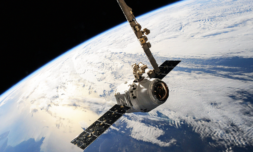Why haven’t Black astronauts been to the moon?
At the time NASA first began ramping up its efforts to explore space, the US was still widely segregated. As a result, the space program was predominantly white.
Edward Dwight was a talented African American astronaut-in-training who regularly faced discrimination from his peers. But when John F. Kennedy learned of his excellence in the 1960s, Dwight was selected to be the first Black man to visit outer space.
Before this could happen though, JFK was assassinated, and Dwight lost his biggest advocate. He was immediately transferred out of space-related training and into Air Force assignments.
It wasn’t until two decades later that Guin Bluford became the first African American in space during the early 1980s – followed by 15 others. By this time, moon landings were no longer on the agenda, with the last manned moon-mission taking place in 1972.
Current astronauts say the reason moon landings haven’t happened lately is due to the vast amounts of funding they require. Securing a budget creates a major political risk that few presidents have had serious support for.
However, President Biden has submitted a budget proposal of $24.7billion for the Artemis Program, which NASA says will help them achieve the goal of diversifying their astronaut program and establishing a permanent research station on the moon.
Why do moon landings matter?
Aside from being an inspiration for future generations, moon landings offer an opportunity to acquire vast amounts of knowledge about the creation of the Universe and Earth itself.
New telescopes can be installed to give us a further look at space, moonrocks can be investigated, and – to the joy of billionaires – economies could be boosted by the introduction of space tourism.
Establishing a permanent base on the moon is viewed by astronauts as a steppingstone to landing and potentially inhabiting on other planets, such as Mars.
NASA’s Chief of Staff Bhavya Lal said, ‘Women and people of colour represent a significant contributing portion of all facets of NASA’s workforce, and the last two astronaut classes selected have included the highest percentage of women in history.’
She continued, ‘50 percent of the 2013 National class was female and 45% of the 2017 class. And today, African American, Asian Pacific Islander, Hispanic and multiracial astronauts are about a quarter of NASA’s active astronaut corps.’
As we fight for equality here on Earth, it’s also important to extend the principle of diversity to space travel. That way, when we all eventually end up living on Mars in 2070, no one will get left behind.





















